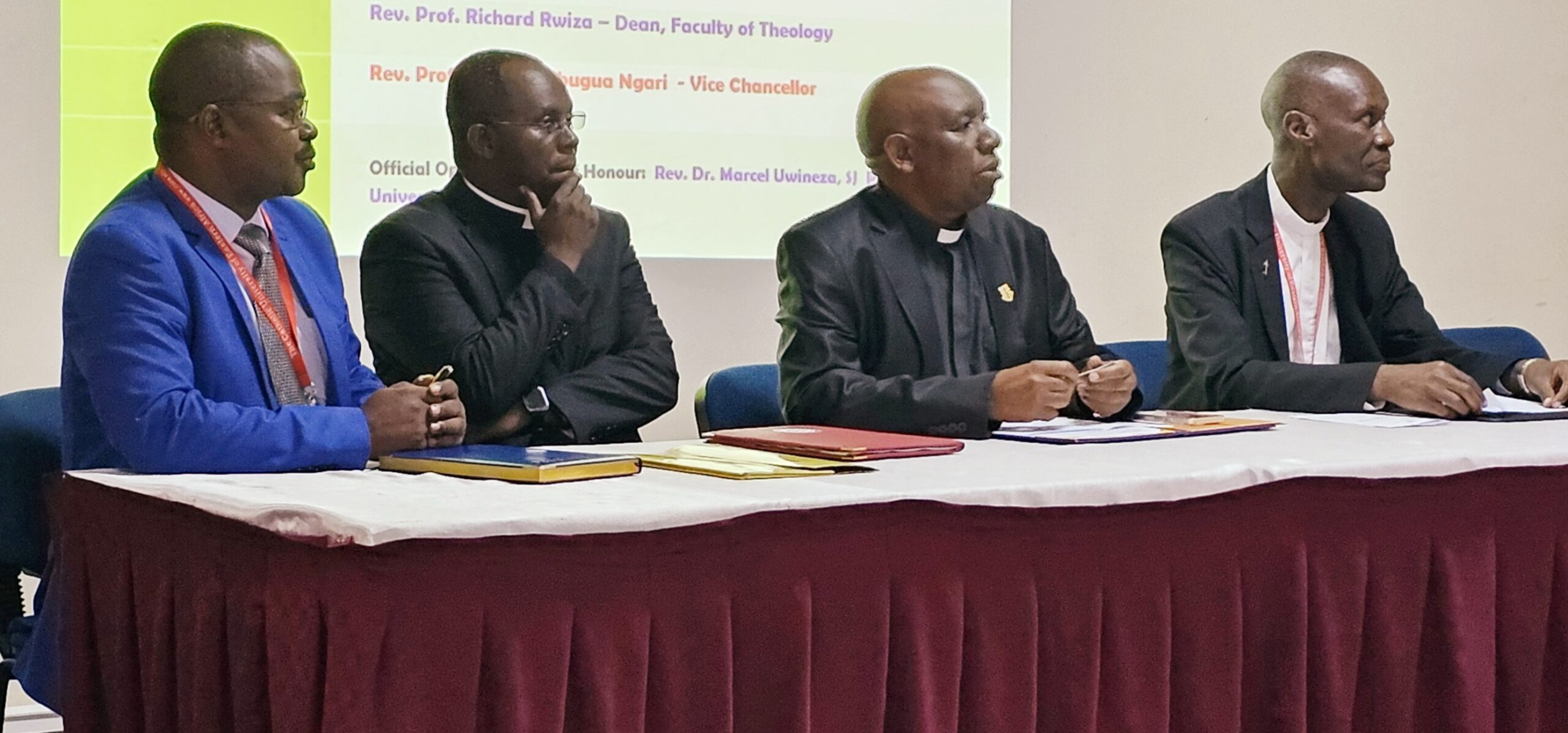
Hekima University College Principal Rev. Dr. Marcel Uwineza SJ has challenged theologians working in various institutions in Nairobi-Kenya and especially at the Catholic University of Eastern Africa (CUEA) to reflect upon the question as to how theology in Africa has contributed to the new evangelization.
Speaking at CUEA as the Guest of Honor. The Principal addressed the 26th Interdisciplinary Session on March 6th whose theme was “Development of Theology of Inculturation: 40 Years of CUEA’s Existence”, Dr. Uwineza pointed out that as CUEA celebrates 40 years of existence, it is also good to remember our failures because success does not happen all the time. It is important to look back and say that we could have done better!
“The question that we should fundamentally ask is, in what ways has Theology in Africa contributed to the new evangelization?” Dr. Uwineza posed as he challenged the paper presenters at the session to ask themselves whether the desire for inculturation of the Gospel has led our African ecclesial communities to act better in different ways than previously. Uwineza, a Rwandan citizen, expressed his skepticism saying that he came from a country that had almost 90% Christians, many of them Catholics, with a history of almost 100 years of evangelization, but they ended up with the genocide.
“While theological arguments are important for the Church, I think they should not be seen to constitute only the goal of Christian evangelization, the inculturation should also refer to the possibility of experiencing God in the world. We will do well to remember that “the mystery of God is not some kind of theorem to be proved but rather but rather an experience to be lived!”
Recalling the words of His late Eminence Joseph-Albert Cardinal Malula from the Democratic Republic of the Congo, who referred to Africa as having a Singing Church in a Sinking Society, Dr. Uwineza observed that despite the effort to evangelize our cultures we are still facing the same challenge Pope Paul VI raised nearly 50 years ago. These include the challenges CUEA Vice Chancellor Rev. Prof Stephen Mbugua talked about in his address to the session at the same event; including the problem of poor leadership, the culture of corruption that is also leading to the impoverishment of Africa, and getting riddled in international debt, a culture of lies in a society where people (especially leaders) blatantly lie to the public and the nations and also lies to the church; negative competition in many forms that do not contribute to growth, but retards it; and the issue of conflict in Africa, among others.
Dr. Uwineza noted that owing to the definition of culture as a historically transmitted pattern of meanings embodied in symbols and of a system of infested conceptions expressed in symbolic forms with which men and women communicate, perpetuate, and develop their knowledge and attitudes of life, the theology done here at CUEA, and anywhere else, should serve as a laboratory to address the challenges of our times. Inculturation should lead to the transformation of cultures.
“Pope Paul VI invites us to take inculturation as an ongoing effort to continually transform accepted values and practices based on the Gospel requirements. What matters is to evangelize human cultures not in a purely decorative way but in a vital way in depth and going to the roots,” Dr. Uwineza said, adding that the transformation of cultures seeks to convert personal and collective consciousness of people. This was mentioned in the recently published book by Bishop Rodrigo Mejia SJ and includes the activities in which they engage, and their lives and should affect the criteria of their judgment.
While posing the question as to what contributions theologians in Nairobi made during the recent raging debates following the release of Fiducia Supplicans, Dr. Uwineza suggested that theologians have a mission to listen and to distinguish the variety of voices of our times and to interpret them in the light of the word, the ‘logos’ so that the truth may be known deeply, may be better presented and ultimately lived.
“This means that theologians have been trusted with the task of bringing Christian faith to dialogue with culture in a way that stimulates and deepens that faith. People’s cultures, history, and experiences carry within them new challenges to which theologians must offer scrutiny,” Dr. Uwineza expressed.
CUEA’s Interdisciplinary Theological Session forms part of the university’s Faculty of Theology contribution to specific thoughts to the global forum. Prof. Mbugua, CUEA Vice Chancellor, in his address to the 26th Session, said that the Faculty of Theology at CUEA is the cradle of formators in the AMECEA Region and beyond. “If you go to the seminaries within the AMECEA Region, there is always somebody from CUEA.”
The Vice-Chancellor further noted that as CUEA turns 40 as a Catholic Institute of Higher Learning, and as a Theological Institute much research has been done on the theme of the 26th Session that embraces the reality of the AMECEA Region and beyond.
Among the people who presented papers at the CUEA’s 26th Interdisciplinary Session was Gregoire Kabore SJ, a second-year theology student at the Jesuit School of Theology Hekima University College. His topic was: The Worrying Silence of African Churches on the issue of the CFA Franc, the local currency used in 14 African Countries from both West and Central Africa.
We are grateful that CUEA invited our Principal to offer the keynote address and we pray that CUEA continues to offer excellent education that consecrates its students and faculty to the search for truth.